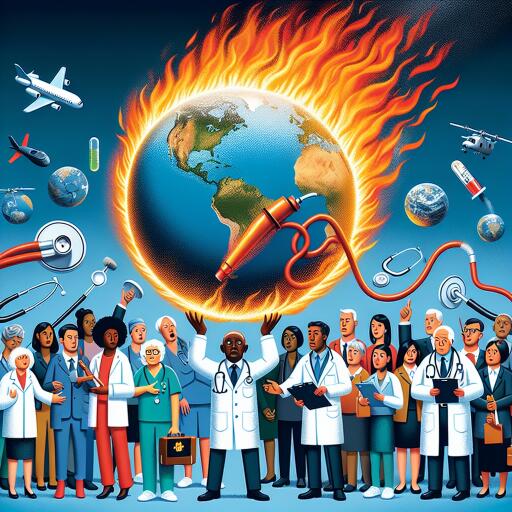
Urgent Climate Resolution Must Be Adopted At This Week’s WHO World Health Assembly
The onset of the World Health Assembly (WHA 77, May 27-June 1) in Geneva marks a pivotal moment for global health governance as the international community converges to deliberate on a myriad of health challenges. Foremost on the agenda is the adoption of a transformative resolution on Climate Change and Health, heralding a significant stride in the intersection of climate action and public health advocacy.
As the world grapples with the escalating threats of climate change, the connection between environmental degradation and human health has never been more apparent. The proposed resolution underscores the detrimental impacts of climate shifts on public health, spotlighting a surge in food scarcity, deteriorating air quality, the resurgence and emergence of infectious diseases, alongside the spike in extreme weather occurrences and their overarching effects on accessible healthcare services.
Integral to the discourse at the WHA is the resolution’s explicit acknowledgment of the exacerbated vulnerabilities faced by marginalized communities, casting a spotlight on the urgent need to address climate-induced gender inequities and the heightened risks to the most susceptible populations. This deliberation not only aligns with the global developmental goals but also amplifies the call for a resilient and sustainable health infrastructure capable of withstanding the adverse impacts of climate change.
The climate-health nexus has gradually ascended the global agenda, gaining unprecedented momentum at COP28. The forthcoming discussions at the WHA are poised to further cement the vital linkage between climate policies and health outcomes. At the core of this narrative is a clarion call for the eradication of reliance on fossil fuels, advocating for a paradigm shift towards renewable energy sources as a measure to safeguard public health and navigate the climate crisis.
The proposed Climate Change and Health Resolution is a comprehensive framework advocating for the integration of climate considerations into health monitoring mechanisms and encouraging intersectoral collaboration to foster climate-resilient healthcare systems. Central to this initiative is the call for the development of a Global Plan of Action on Climate Change and Health, aimed at guiding the collective efforts of WHO member states towards mitigating the health impacts of climate change.
The resolution’s draft, poised for adoption by consensus, embodies a landmark international accord, reflecting the collective resolve of nations to confront the health ramifications of climate change through a concerted global response. This collaboration underscores the critical narrative of climate and health intersectionality, emphasizing the necessity for an integrated approach in tackling the climate crisis.
However, the resolution’s current draft has drawn attention to its limitations, particularly its omission of explicit references to the detrimental role of fossil fuels and the imperative for a just transition to sustainable energy solutions. Critics argue for a more robust articulation of climate-health policies that encompass national health strategies and effectively address the disparities experienced by vulnerable groups, including the youth, the elderly, and displaced populations.
In anticipation of the WHA’s resolution, the global health community stands at the cusp of a defining moment. The assembly’s outcomes promise to shape the trajectory of global health governance, presenting an unprecedented opportunity to fortify the nexus between climate action and public health. As the discussions unfold, the vibrancy of civil society engagement and the collective will of the international community will be pivotal in shaping a healthier, more sustainable future for all.
In the aftermath of the assembly, the onus lies on WHO to spearhead the development of strategies and initiatives such as the Global Plan of Action on Climate Change and Health. This pivotal document will serve as a blueprint for operationalizing the resolution, marking a strategic thrust towards a climate-resilient healthcare future.
As we progress towards WHA78 in May 2025, the continued collaboration among global health leaders, environmental advocates, and policymakers will be crucial in realizing the aspirations of the resolution. It is a testament to our collective commitment to safeguarding health in the face of climate adversity, a beacon of hope in our endeavor to foster a healthy planet for future generations.





Leave a Reply